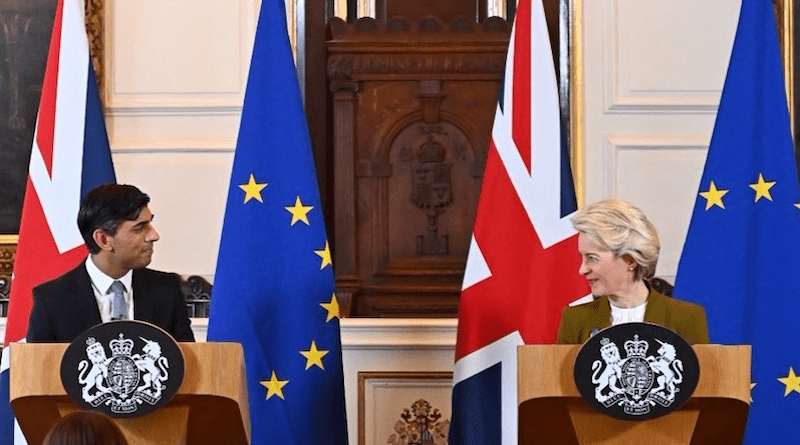Brexit: UK PM Rishi Sunak Makes Breakthrough But ‘Brexiternity’ Continues – OpEd
By Arab News
By Andrew Hammond
UK Prime Minister Rishi Sunak this week struck a deal with the EU over the Northern Ireland protocol. Yet, even if the agreement is approved by legislators, it will not end the state of flux that has dogged the UK since 2016, which has been called “Brexiternity.”
Seen from the vantage point of early 2023, it is clear that the 2016 EU referendum was a seminal moment in UK postwar history. But far from being a single, isolated event, Brexit should be seen as a process made up of multiple negotiations, including within the UK, between the EU and the UK, and within the EU about its future.
The Northern Ireland protocol deal, which still has to be signed off by the UK parliament, is only the latest chapter in these debates. After four months of negotiations, Sunak and European Commission President Ursula von der Leyen on Monday announced the proposed Windsor Framework, which seeks to resolve the challenges of the previously agreed Northern Ireland protocol.
That protocol is part of the UK-EU Withdrawal Agreement that formally took the country out of the EU. Its purpose is to prevent a hard border on the island of Ireland by requiring Northern Ireland to align with EU law in some areas and allowing it to maintain frictionless access to the bloc. However, it also means that goods entering Northern Ireland from England, Scotland and Wales need to prove they comply with EU law in these areas.
At the heart of the revised pact are several key issues: physical controls and checks on trade to Northern Ireland from England, Scotland and Wales, the role of the European Court of Justice, the application of EU law, and the place of Northern Ireland in the UK’s internal market.
On the first issue, it is understood that the majority of controls and checks will disappear on goods destined to remain in Northern Ireland. The role of the European Court of Justice as the ultimate arbiter of disputes will be removed, while the EU will no longer have the right to automatically launch proceedings against any so-called infraction of the protocol. The UK and EU will deliver the deal through removing customs paperwork for consumers, guaranteeing medical supplies in the long term.
There will also be a new “Stormont brake” to give assembly ministers in the devolved legislature in Northern Ireland a say on EU laws, allowing them to stop them applying in that nation. Moreover, Northern Ireland’s ministers will be given sight of new EU laws as they are drafted.
In turn, it is hoped by Sunak and Von der Leyen that the deal will help guarantee the future of peace and stability. This comes about a quarter of a century after the landmark Good Friday Agreement helped bring an end to the Troubles in Northern Ireland.
However, the deal is far from done. Sunak is concerned about possible resistance from the hard-line Brexiteer camp in his Conservative Party, plus the Democratic Unionist Party, which wants the protocol scrapped altogether.
Even if Sunak can surmount these challenges, however, the UK’s Brexit saga is by no means at an end. As Chancellor Jeremy Hunt, for instance, has said in recent weeks, London and Brussels are likely to have an increasingly close economic relationship in the years to come.
This underlines that, as the seventh anniversary of the UK’s landmark EU referendum approaches, the nation’s relationship with Europe is still not settled. And it is likely to remain so for years, if not decades, to come.
So, as much as the new Windsor Framework may be a milestone, the relationship between London, Brussels and the 27 EU member states will continue to evolve for many years. It is therefore possible — in a similar scenario to Swiss-EU relations over the last 30 years — that a series of further UK-EU bilateral deals will be made to fashion the new institutional relationship.
For the decade ahead, at least, the UK may well also follow a path of incremental changes. Far from “getting Brexit done” in 2019 and 2020, as former Prime Minister Boris Johnson frequently asserted, this points to UK-EU negotiations and internal political wrangling continuing long into the future.
Moreover, views on the relationship the nation wishes to have with Brussels could well change significantly over time, in a more or less integrationist direction, as political and public opinion evolves.
Taken together, all of this is why London may, ironically, now need to devote at least as much of its attention to the EU in the coming years as it did when it was a member. The stakes in play therefore remain huge and historic, as both sides continue to fashion a new partnership that can hopefully bring significant benefits for both at a time of significant geopolitical turbulence.
- Andrew Hammond is an Associate at LSE IDEAS at the London School of Economics.

